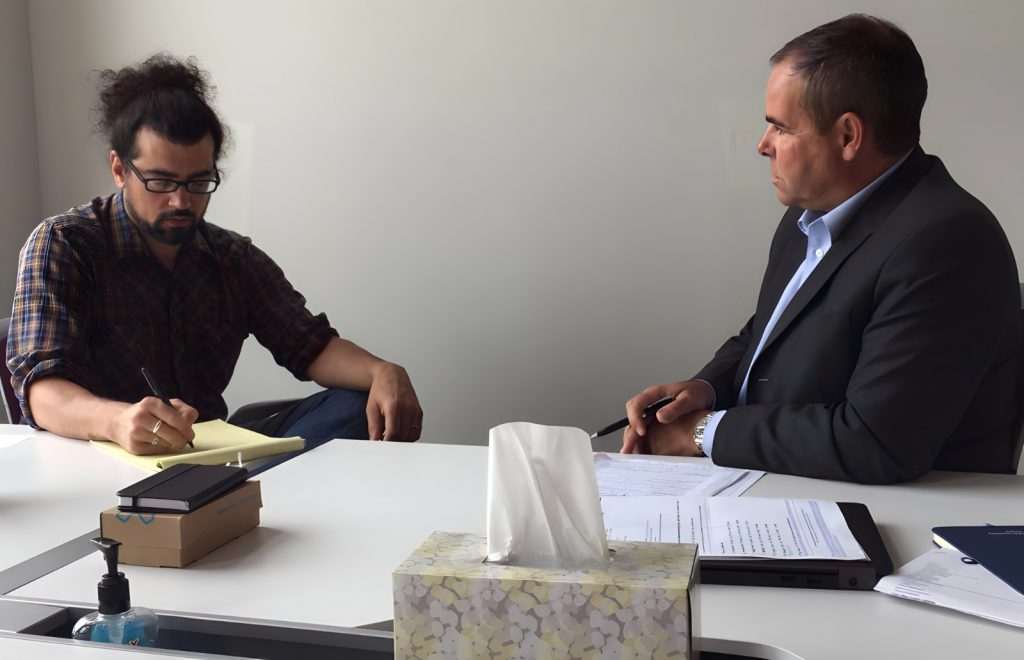Mention the word “farm” to someone and they are likely to think of barns, silos, tractors and hay bales.
Say the word “farm” to Amos Petersen and he could start chatting about Fitbits for pigs and technology that allows farmers to track animal behavior, giving farmers tools to reduce costs through proactive monitoring of animal illness and injury.
Aligning these two visions of American farming is FarrPro, the Iowa-based company that Amos founded in 2017 and which has grown to be a leading light in the movement toward digital agriculture.
While pursuing degrees in Electrical Engineering and Economics at the University of Iowa, Amos was introduced to some of the issues facing commercial scale farming. These issues were similar to those problems he knew from his years on his family’s smallholder farm in Mediapolis, Iowa.
One issue was the use of inefficient heat lamps, that wasted energy, to keep baby pigs warm. The inefficiency of the heat lamps, Amos said, correlated with the poor health of the piglets.
Speaking of the heat lamps, he said, “They were just no good. It was an interesting problem to me—a hundred-year-old problem that began with the Edison lamp and from which the pork industry had not moved in over a century.”
Amos used that problem as the basis for development of his first entrepreneurial product—an incubator for piglets called the Haven. The incubator abandoned the heat lamps and incorporated energy efficient and durable materials in production. It administered a near-perfect microclimate for the baby pigs and kept waste heat from bothering the sows. An early analysis proved success—the incubators made the sows more comfortable and slashed pre-weaned mortality rates by 20-30 percent.
This incubator laid a foundation for the Sentry System, the disruptive digital twin of the human error-prone pen and paper systems that the industry currently uses.
As the team continues to rewrite the playbook for farming, Amos remains dedicated to simple values that, along with the tech, are driving him to spur innovation for farmers nationwide.
“Transparency and insight are two sides of the same coin,” Amos said. “Obviously, if you are aware of what is happening with an animal, you enable better care for the animal. Enabling better animal care leads to more productive outcomes for farmers and, if you are using an autonomous health management system like Sentry, that higher standard of care inspires confidence in the consumer. It’s truly a win-win-win situation.
“Imagine a world where you could buy a gallon of milk that’s been produced in accordance with your own preferences. It’s verifiable all the way from the calf that became the dairy cow, what it ate, the veterinary care it received, how it was treated and with what medications, all the way through to how the milk got to the store and then to your table. It’s the same with pork, it’s the same with all animal agriculture. Better insights into the health of individual animals pay all the way forward to the store shelves and the dinner plate. We are coming to a place where a product that isn’t traceable will be discounted as questionable by consumers. Traceability and provenance won’t be ‘nice-to-haves,’ they will be ‘table’ stakes.”
FarrPro has assumed a pivotal role in the production of animal protein; improving the health of animals; allowing farmers to generate more profit; and providing better products for consumers. At the same time, Amos has made sustainability a guiding principle of his team’s overall effort.
At the heart of FarrPro’s operations is the aforementioned Sentry System, which consists of three parts: the Sentry Tracker, a wearable device that records health and behavior information continuously; the Sentry Mobile App, which workers use to check in on health warnings and record task completion; and the Sentry Control Center, a web portal that provides management with insight into and control over the health of the herd and productivity of their workforce.
Piglets can begin wearing the ear tags as soon as they are a few weeks old, allowing comprehensive health and treatment records to be made for them as they move through the system. Through early intervention, this knowledge prevents injuries and other health challenges, that might otherwise not be noticeable to the harried staff, from becoming critical. This data also reduces costs for farmers, as they use the same data to reduce losses to lameness and costly disease outbreaks.
The Sentry System can also aid in the genetic selection of animals that grow better within the same environment as pigs that are not as robust. This aspect of the Sentry System sets the stage for increased production worth billions of dollars; as well as a more sustainable industry.
Amos continues to rely on his entrepreneurial spirit to shift farming, using more technology. Once his startup’s technologies achieve wide use in the pork industry, FarrPro will work to expand the Sentry System to other sectors of animal agriculture.
“Once we win in the pork industry, we’ll go broad into other animal verticals,” Amos said, “cattle and poultry are our next targets. But it’s the pork industry first. It’s first because it’s the hardest and the need is greatest. The economics that win in the pork industry will position us to lead digital animal health for the next generation.”
Visit farrpro.com to learn more.
